Background
Bob Knight was born on October 25, 1940, in Massillon, Ohio. He is the son of Pat, a railroad worker, and Hazel Knight.

1968
Michael William Krzyzewski and Bob Knight (right)
1968
Michael William Krzyzewski and Bob Knight (left)
1985
Bob Knight
2007
Bob Knight
2008
Bob Knight
2020
Bob Knight (left) and Isiah Lord Thomas III
281 W Lane Ave, Columbus, OH 43210, United States
Bob Knight studied at Ohio State University. He got a Bachelor of Science.
841 Ella St, Orrville, OH 44667, United States
Bob Knight studied at Orrville High School.
Bob Knight





















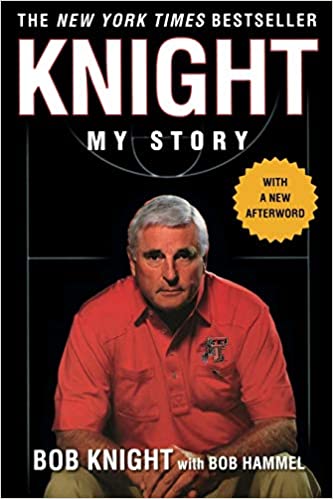
(This is the first by Bob Knight, one of the most literate...)
This is the first by Bob Knight, one of the most literate, candid, quoted, and outspoken men in American public life telling in this first-person account of his full, rich life.
https://www.amazon.com/Knight-My-Story-Bob/dp/0312311176
2002
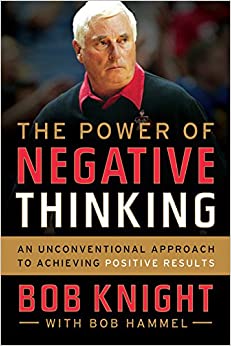
(The legendary basketball coach Bob Knight explains why "n...)
The legendary basketball coach Bob Knight explains why "negative thinking" will actually produce more positive results in sports and daily life.
https://www.amazon.com/Power-Negative-Thinking-Unconventional-Achieving/dp/054402771X
2013
Bob Knight was born on October 25, 1940, in Massillon, Ohio. He is the son of Pat, a railroad worker, and Hazel Knight.
Bob Knight attended Orrville High School. Besides, he graduated from Ohio State University, where he received a Bachelor of Science in 1962.
Bob Knight played several sports in high school and was a great admirer of Ted Williams. Baseball was his first passion, but Knight's stubbornness changed his direction when he turned to basketball in defiance of a suspension by his baseball coach for failing to follow an order. He already had leanings toward coaching and later in his career shared friendships with coaches of basketball, baseball, and football, including Vince Lombardi, Bear Bryant, and Joe Paterno.
In attending and graduating from Ohio State University, Bob Knight prepared for a career in law. He majored in education and minored in government and history. On the court, he played mostly as a substitute for Buckeyes coach Fred Taylor, but he picked up coaching tips that he used during the year he coached high school basketball in 1962-1963. After it, Knight enlisted in the Army and accepted an assistant coaching position with the Black Knights in 1963, and, after two years, at the age of 24, he was named the head coach of the program. He was inspired by General George Patton and by Colonel Red Blake, former Army football coach and author of You Have to Pay the Price.
In 1971 Bob Knight started to work at the Indiana University Bloomington. He began to recruit the most promising high school players offering only his winning program to young men who were often tempted with promises of money, guaranteed grades, and other incentives. As a result, his teams won. They ended the 1976 season undefeated and took the National Collegiate Athletic Association national championship. Knight coached players who went on to successful careers, including Quinn Buckner, Isiah Thomas, and Steve Alford.
Knight coached the 1979 United States team in the Pan-American Games held in San Juan, Puerto Rico. Although they won the gold medal, Knight became embroiled in controversy for swearing at a player, verbally putting down an official, and for engaging in a physical encounter with a policeman. For the last, he was fined and sentenced to jail time, which he avoided by returning to the United States. Indiana finished in the top two for the next two years and won its second national championship in 1981. During the Final Four, Knight dropped a Louisiana State fan into a trash barrel.
Columbia Broadcasting System Sports offered Bob Knight $500,000 a year to head the telecasting of the National Collegiate Athletic Association tournament, and Knight was ready to take the job until his star player, Landon Turner, was injured in an automobile accident and paralyzed. Knight spent months raising money for Turner's care and turned his recruiting responsibilities over to his assistant coaches. The team finished in the top three over the next three years, and Knight took the United States team to gold in the 1984 Olympics held in Los Angeles. This team included players Michael Jordan, Patrick Ewing, and Chris Mullin.
In the following years at Indiana, Bob Knight continued to collect championships and accolades. He also continued to court controversy. In 1997 Knight was investigated for striking guard Neil Reed, and the school instituted a "zero-tolerance" policy that Knight breached continuously over the next few years, like in 2000 when he allegedly grabbed freshman Kent Harvey by the neck. Despite his difficulties with the administration, Knight remained popular with fans and students. He learned that he was fired by phone while on a fishing trip in Canada that he had refused to postpone. So, Knight ended the season with a three-game losing streak.
Bob Knight served at the Texas Tech University Red Raiders from 2001 to 2008. The first season yielded a record of twenty-three wins, ten losses, and the team went to the National Collegiate Athletic Association tournament. Following the season, Knight collaborated with Bob Hammel, the awarding-winning sportswriter who had been with the Bloomington Herald-Tribune until his retirement, to write his memoir Knight: My Story. In his other book, The Power of Negative Thinking, Knight reveals that part of the reason for his success is that he thinks about things that can go wrong, then decides how to handle them so that they don't. This strategy can prevent mistakes and problems, which can lead to more success.
Additionally, Bob Knight worked at the Entertainment and Sports Programming Network. He served there from 2008 till 2015 as a studio analyst and commentator for the network. Knight also was a trustee at the Naismith Memorial Basketball Hall of Fame.
Bob Knight is one of the highest achievers in college basketball history, and certainly one of its most controversial figures. He was the men's basketball coach of the Indiana Hoosiers for twenty-nine years and also coached at Army and Texas Tech.
In 1957 Bob Knight was a Most Valuable Player by the Orrville High School. His coaching record includes many national championships. He coached the Pan-American Games basketball team in 1979 and the Olympic basketball team in 1984, which both won United States gold medals. Knight became the National Coach of the Year four times, in 1975, 1976, 1987, and 1989, and also a Big Ten Coach of the Year eight times, in 1973, 1975, 1976, 1980, 1981, 1989, 1992, and 1993. In 1976 he was named National Coach of the Year by the Associated Press and Basketball Weekly. In 1975 and 1989, he earned the Henry Iba Award, and in 2002, the Clair Bee Coach of the Year Award. In 1991 he was inducted into the Basketball Hall of Fame. In 2006 Knight was recognized for his impact on college basketball as a member of the founding class of the National Collegiate Basketball Hall of Fame and in 2007 became the recipient of the Naismith Award for Men's Outstanding Contribution to Basketball. Knight was also inducted into the Army Sports Hall of Fame and the Indiana Hoosiers athletics Hall of Fame, and in 2003 he was honored as the first inductee in The Vince Lombardi Titletown Legends.
(This is the first by Bob Knight, one of the most literate...)
2002(The legendary basketball coach Bob Knight explains why "n...)
2013Bob Knight adapted to the strict discipline and applied his methods to a shocked Indiana team. He often called the will to prepare one of the most significant parts of success. Knight toughened practices and forbid alumni from viewing them, which he considered a distraction, and he demanded silence when he spoke with the players. Furthermore, he was a staunch believer in academics. His teams were well-known for performing well in school, as it was a requirement of all of his players. During his entire career, only four of his four-year players did not graduate (meaning 98% did graduate).
With regards to his coaching philosophy, Bob Knight popularized the "motion offense." His teams were known for their proficient passing and unselfishness. On defense, Knight was a proponent of tenacious "man-to-man" defense. However, occasionally, he would implement a zone defense to throw opponents off guard. His schemes were flexible and could adapt to different styles. Knight also evolved his offenses over the years, incorporating new developments in basketball, such as incorporating elements of the Princeton offense when it became popular. He gave his players option plays, where they were meant to stand in a particular spot on the floor, but had different plays they could run depending on the opponent's defense.
Quotations:
"Most people have the will to win, but few have the will to prepare to win."
"A big part of teaching is being emphatic. Maybe I'm right or wrong, but part of my approach was that when I said something, the kids understood exactly what I meant and what I wanted."
Bob Knight was known for his fiery temper on and off the court. His coaching style revealed him to be a man of strategy who could often figure out the best way to win.
Bob Knight married Nancy Falk on April 17, 1963. They have two sons, Tim and Patrick, but they divorced in 1985. Knight's second wife was Karen Edgar. They married in 1988.
Hazel Knight's maiden name was Henthorne.
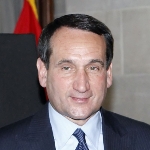
Mike Krzyzewski is an American college basketball coach who amassed the most coaching victories in National Collegiate Athletic Association Division I men's basketball history.
Nancy Falk was Bob Knight's first wife. They divorced in 1985.
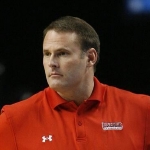
Patrick Knight is an American basketball coach and scout.
Karen Edgar was an Oklahoma high school basketball coach.
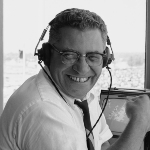
Vince Lombardi was an American professional gridiron football coach who became a national symbol of single-minded determination to win.
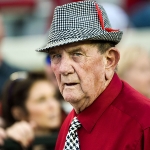
Bear Bryant was an American college football coach who set a record (later broken) for more games won than any other collegiate coach.
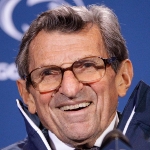
Joe Paterno was an American collegiate gridiron football coach who, as head coach at Pennsylvania State University, was the winningest major-college coach in the history of the sport, with 409 career victories.
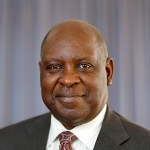
Quinn Buckner is an American former professional basketball player and coach. In 1984, he won a National Basketball Association title with the Celtics.
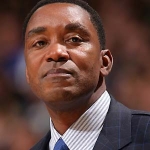
Isiah Thomas is an American former professional basketball player, coach, and executive who played his entire career for the Detroit Pistons of the National Basketball Association.

Steve Alford is an American men's college basketball coach and former professional player who is the head coach for the Nevada Wolf Pack of the Mountain West Conference.
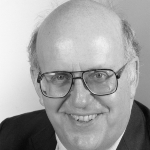
Bob Hammel's journalism career spanned fifty years, including thirty as sports editor and forty as a columnist at the Bloomington Herald-Times.
